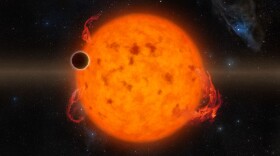A team led by an undergraduate student at UT Austin discovered two hidden planets more than 1,000 light-years away in the constellation Aquarius.
To put that distance in perspective: One light-year is about 6 trillion miles.
It's not just the news of the discovery that's exciting for deep-space explorers, it's how the planets — dubbed K2-293b and K2-294b — were discovered.
Anne Dattilo's team created an algorithm that sifts through the data taken by the Kepler space telescope to find signals missed by more traditional planet-hunting methods, the university said.
Dattilo told KUT's Trey Shaar it would take years and years for a human to go through each of the "targets" in the telescope's field and determine which ones are planets.

That's where artificial intelligence comes in. Andrew Vanderburg, the NASA Sagan fellow at UT Austin, said AI helps the team search the Kepler data set uniformly. He said even if every star had an Earth-sized planet around it, researchers wouldn't be able to find them all.
"That’s just because some of the data’s too noisy, or sometimes the planets are just not aligned right. So, we have to correct for the ones we missed," Vanderburg said. "We know there are a lot of planets out there that we don’t see for those reasons."
The discoveries have been accepted for publication in The Astronomical Journal, UT said.
"I'm really proud of what we accomplished. Finding two planets is [a] pretty big deal, especially for an undergraduate such as myself," Dattilo said. "But I still think there's more to do, and I'm still doing the research and continuing to make it better."
Dattilo said she will continue her planet hunting when she enters graduate school in the fall.




